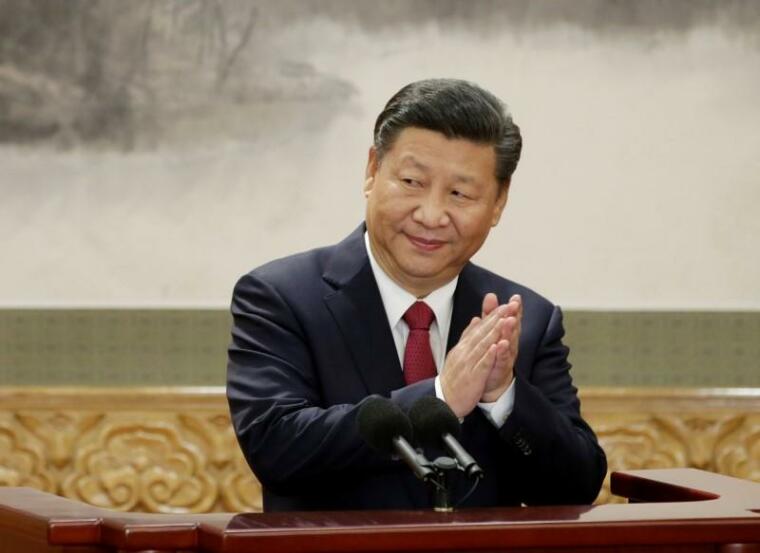China tells Christians to replace images of Jesus with Xi Jinping to qualify for poverty relief

Officials in rural southeast China are reportedly urging Christians to replace posters of Jesus with photos of President Xi Jinping in order to receive poverty relief packages.
According to South China Morning Post, officials in Yugan's Huangjinbu township visited poor Christian families over the weekend to promote the Chinese Communist Party's poverty-relief program.
A local social media account reported that during the visit, the officials had "melted the hard ice in their hearts" and "transformed them from believing in religion to believing in the party."
The report went on to claim that more than 600 villagers "voluntarily" replaced religious texts and paintings in their homes with 453 portraits of the Chinese president.
Qi Yan, chairman of the Huangjinbu people's congress and the person in charge of the township's poverty-relief drive, noted that the campaign had been running across the county since March with the aim of teaching Christian families how much the party had done to help eradicate poverty.
"Many poor households have plunged into poverty because of illness in the family. Some resorted to believing in Jesus to cure their illnesses. But we tried to tell them that getting ill is a physical thing and that the people who can really help them are the Communist Party and General Secretary Xi," Qi said.
"Many rural people are ignorant. They think God is their saviour ... After our cadres' work, they'll realise their mistakes and think: we should no longer rely on Jesus, but on the party for help," the official continued.
According to Qi, there are about 5,000 to 6,000 Christians currently residing in Huangjinbu. He noted that the township government had distributed more than 1,000 portraits of Xi and that all of them were displayed in residents' homes.
A resident of another township in Yugan, identified only by his surname, Liu, said that many of the villagers were told to remove religious artifacts from their homes, adding that many did not do so voluntarily.
He said that many families were forced to remove their images because they would not be able to receive their poverty relief packages if they did not do so.
Qi had denied the assertion that the funds were contingent on the removal of religious images. He went on to say that the government only asked the villagers to place photos of Xi over their religious images in the "center of their home," not their bedrooms or other private areas.
"They still have the freedom to believe in religion, but in their minds they should [also] trust our party," the official said.
Under Xi's leadership, the Chinese government has stepped up its clampdown on religious freedom across the country, ranging from the removal of crosses on churches in eastern China to the suppression on Islamic practices in Xinjiang in the name of fighting terrorism and separatism.
According to Breitbart News, the clampdown is being extended to other autonomous regions like Hong Kong, where the government has exerted its control over Christian events.
Hong Kong Christian activist Derek Lam noted in August that the government had begun hijacking Christian youth events in an attempt to promote "One Belt One Road," an infrastructure project launched by China in an attempt to gain complete dominance of the Asian economy.
 Christians don't have to affirm transgenderism, but they can’t express that view at work: tribunal
Christians don't have to affirm transgenderism, but they can’t express that view at work: tribunal Archaeology discovery: Medieval Christian prayer beads found on Holy Island
Archaeology discovery: Medieval Christian prayer beads found on Holy Island Presbyterian Church in America votes to leave National Association of Evangelicals
Presbyterian Church in America votes to leave National Association of Evangelicals Over 50 killed in 'vile and satanic' attack at Nigerian church on Pentecost Sunday
Over 50 killed in 'vile and satanic' attack at Nigerian church on Pentecost Sunday Ukrainian Orthodox Church severs ties with Moscow over Patriarch Kirill's support for Putin's war
Ukrainian Orthodox Church severs ties with Moscow over Patriarch Kirill's support for Putin's war Islamic State kills 20 Nigerian Christians as revenge for US airstrike
Islamic State kills 20 Nigerian Christians as revenge for US airstrike Man who served 33 years in prison for murder leads inmates to Christ
Man who served 33 years in prison for murder leads inmates to Christ


 Nigerian student beaten to death, body burned over ‘blasphemous’ WhatsApp message
Nigerian student beaten to death, body burned over ‘blasphemous’ WhatsApp message 'A new low': World reacts after Hong Kong arrests 90-year-old Cardinal Joseph Zen
'A new low': World reacts after Hong Kong arrests 90-year-old Cardinal Joseph Zen Iran sentences Christian man to 10 years in prison for hosting house church worship gathering
Iran sentences Christian man to 10 years in prison for hosting house church worship gathering French Guyana: Pastor shot dead, church set on fire after meeting delegation of Evangelicals
French Guyana: Pastor shot dead, church set on fire after meeting delegation of Evangelicals ‘Talking Jesus’ report finds only 6% of UK adults identify as practicing Christians
‘Talking Jesus’ report finds only 6% of UK adults identify as practicing Christians Mission Eurasia ministry center blown up in Ukraine, hundreds of Bibles destroyed: 'God will provide'
Mission Eurasia ministry center blown up in Ukraine, hundreds of Bibles destroyed: 'God will provide' Church holds service for first time after ISIS desecrated it 8 years ago
Church holds service for first time after ISIS desecrated it 8 years ago Burger King apologizes for 'offensive campaign' using Jesus' words at the Last Supper
Burger King apologizes for 'offensive campaign' using Jesus' words at the Last Supper Uganda: Muslims abduct teacher, burn him inside mosque for praying in Christ’s name
Uganda: Muslims abduct teacher, burn him inside mosque for praying in Christ’s name